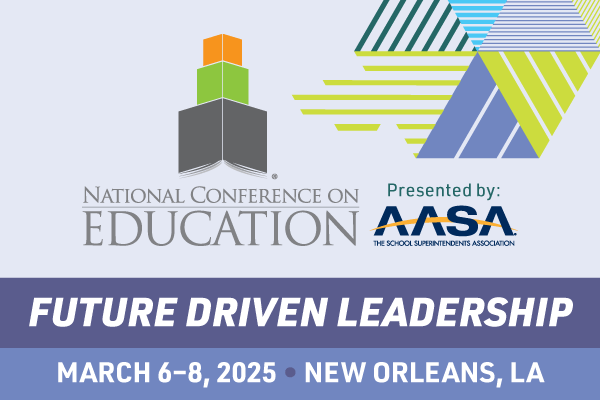AASA Issues First-of-its-Kind Early Learning Toolkit
February 28, 2022
FOR IMMEDIATE RELEASE
Contact:
James Minichello
703-774-6953
jminichello@aasa.org
Resource Designed to Create Positive Change in America’s Schools
Alexandria, Va. – February 28, 2022 – Today, AASA, The School Superintendents Association, the nation’s leading organization for school system leadership, released a toolkit aimed at supporting all providers of early learning, especially school districts, as they embrace the significant responsibility of providing early childhood education.
Designed by AASA’s Early Learning Cohort, the Early Childhood and Learning Toolkit is a resource offering actionable practices that provide educators with a gateway to explore and define ways to make a positive difference in the lives of the nation’s 50 million public school children and their families.
Established in 2017, the cohort consists of a group of superintendents, central office administrators, building principals, teachers and educational leaders from across the U.S. committed to supporting school systems nationwide.
“This toolkit was created to serve as a ‘go-to’ resource for district leaders to enact meaningful change to support and prepare their schools for success in early childhood education,” said Daniel A. Domenech, executive director, AASA. “Educators must take steps to ensure bold strategies in early childhood education that will impact practices in the classroom, the community and all school levels. We thank all of our partners who contributed to this initiative.”
“From centering practice on equity and committing and providing continuous professional development for early educators, to cultivating relationships with local early childhood education partners and nurturing participation among parents, this toolkit truly aligns with the Head Start model,” said Yasmina Vinci, executive director, National Head Start Association. “No doubt, this resource will support educators in their important work to create environments where all students thrive, and all families can weather crises and reach for opportunity.”
AASA’s National Panel on Early Learning—the key supporters of the toolkit—is comprised of the nation’s leading experts in the field, including the Buffett Family Foundation, First Book, the National Association for the Education of Young Children, National Head Start Association and Waterford.org.
“For 30 years, First Book has focused on elevating educational equity for kids from low-income families, and that starts at the earliest ages,” said Kyle Zimmer, president and CEO, First Book. “Given that the challenges in early learning have significantly increased over the course of the pandemic, the need to collaborate on this critical issue has never been more important. This resource offers a framework for implementing the best early childhood education practices based on specific, local needs. Every school district leader in the country can benefit from this toolkit. First Book is at the ready to support Title I schools nationwide, from early childhood through high school.”
“We know that the number-one predictor of reading scores in high schools is reading scores from first grade. If you want to have success in school, it is so critical to start early,” said Benjamin Heuston, executive director, Waterford.org. “We are proud to partner with AASA on this project to help educators understand that there is clear research in this area, and that there are tools and approaches readily available to help outcomes for our young learners.”
Three school districts highlighted in the toolkit were West Valley (Wash.) School District,Wichita Falls (Texas) Independent School District, and Ann Arbor (Mich.) Public Schools—to examine best practices that have been well-established to help children and families be successful.
The toolkit provides seven strategies designed to offer educators a blueprint for success. They are:
• Promote Equity from the Start
• Improve Alignment and Transitions
• Establish Partnerships with the Early Childhood Education Community
• Engage Families and Communities Early
• Support Strong Executive Function and Social Emotional Learning
• Provide Ongoing Professional Development for Early Educators
• Self-Assessment Tools for the early childhood education community
“Today, early learning programs vary in quality, delivery style, content and purpose,” said Deborah Bergeron, deputy director for community engagement and innovation, National Head Start Association and Early Learning Cohort lead. “This free toolkit provides districts with resources designed to fit the needs of their specific school systems based on the culture of their communities. The toolkit uses research-based practices so districts can feel confident when building their early learning programs.”
“Throughout the past five years, the AASA Early Learning Cohort has been collecting, studying, sharing and implementing proven strategies to make early childhood matter most,” said Edward Manuszak, superintendent, Dundee (Mich.) Community Schools, and cohort lead superintendent. “This resource was created for superintendents and other administrators to sustain appropriate practices to connect their districts with their families and children they serve.”
Through on-site visits, collaborative meetings and virtual webinars, the Early Learning Cohort has assembled research-based strategies to ensure high returns on investment of their early learning programs, especially for disadvantaged students.
“We’re always looking for additional strategies to implement and by being part of this learning community, it’s helped to keep our focus on continuous improvement and what we can do better to serve our children and families,” said Peter Finch superintendent, West Valley (Wash.) Schools, and Early Learning cohort lead superintendent.
“Early learning matters,” said Mort Sherman, associate executive director, AASA. “If we don’t make early learning foundational, if we don’t make it a core component of what we do in American education, how would it be possible to improve education?”
Click here to access the Early Childhood and Learning Toolkit. To learn more about the program, visit the AASA Early Learning Cohort webpage. Superintendents and other school system leaders can also contact Sherman at msherman@aasa.org, or Debbie Magee, director, AASA leadership network, at dmagee@aasa.org for more information.
###
About AASA
AASA, The School Superintendents Association, founded in 1865, is the professional organization for more than 13,000 educational leaders in the United States and throughout the world. AASA’s mission is to support and develop effective school system leaders who are dedicated to equitable access for all students to the highest quality public education. For more information, visit www.aasa.org.



